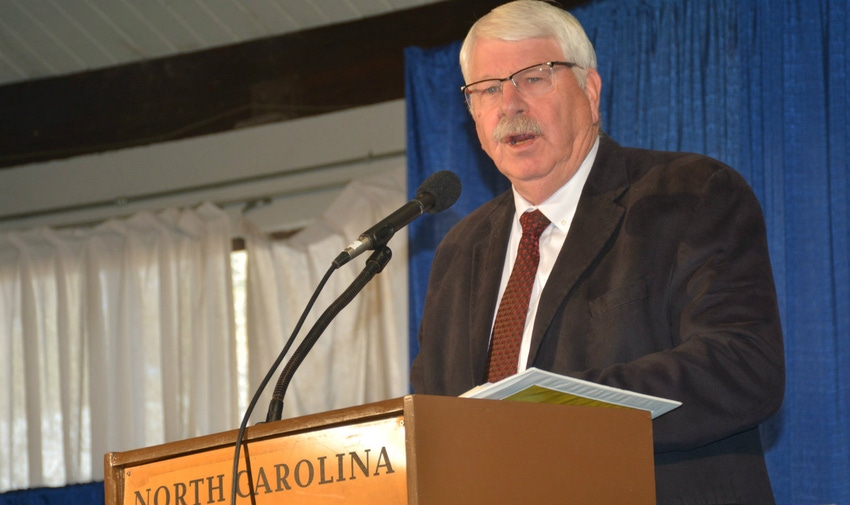
N.C. ag commissioner urges farmers to take serious look at new crops
North Carolina is already leading the way in developing industrial hemp as a new cash crop for the state’s farmers, but Troxler also sees potential for growing carrots that can be used for natural food coloring and producing veneering poplar trees, primarily used for making veneer.

With challenges facing North Carolina agriculture, particularly tobacco, the state's agriculture commissioner, Steve Troxler, says it is time for farmers to take a serious look at new crops.
Delivering his annual State of North Carolina Agriculture address at the Ag Development Forum during the Southern Farm Show at the State Fairgrounds in Raleigh, Troxler said further research needs to be done on potential new crops to see if they will work in North Carolina.
North Carolina is already leading the way in developing industrial hemp as a new cash crop for the state’s farmers, but Troxler also sees potential for growing carrots that can be used for natural food coloring and producing veneering poplar trees, primarily used for making veneer.
“We are looking at bioenergy research projects. One of the successes that came out of this is ‘pellets for pullets’ where poultry houses are being heated by burning wood pellets. We are exporting a lot of wood pellets to the European Union for production of power, so if we are making them here, growing the trees here, and there’s a benefit, we need to take a more serious look at that,” Troxler said.
He pointed to research showing there is less moisture in poultry houses when these wood pellets are burned, resulting in a better product reaching the market. He said North Carolina needs to take a close look at developing this market.
Industrial hemp is exploding in North Carolina and works well, particularly as an alternative crop for tobacco farmers, Troxler said. He anticipates strong growth for the industry.
As of January, there were 492 growers licensed to produce hemp on 6,637 acres in North Carolina. That’s up from 124 licensed growers producing hemp on 2,300 acres for the same time last year. Moreover, there is 2.7 million square feet of greenhouse space used to produce hemp indoors, up from 242,000 square feet of indoor greenhouse cultivation last year. Troxler said there are also 322 registered hemp processors in North Carolina; that’s up from 44 last year.
“I have to throw in a word of caution,” Troxler said. “I’m really afraid my theory of agricultural economics is going to take place. And that is if you put a good profit margin in front of a farmer, he’s going to farm his way out of it as quickly as he can by over-production. I think we can over-produce this very quickly and we are going to try to craft a program in North Carolina that helps with this.”
Troxler pointed out that industrial hemp not being labeled as a schedule one narcotic in the new farm bill is a key factor that will lead to expansion of the crop across the United States. He said his department will work with the North Carolina legislature to put in place a permanent hemp program that meets USDA guidelines.
Moreover, Troxler said his department will ask the North Carolina Legislature for the ability of its food and drug division to regulate the production of CBD oil from hemp. “We have seen cases in North Carolina where it is being done in out buildings, in kitchens, with no regards to sanitation or the efficacy of the product. We will ask for the authority that if it’s being produced for human consumption that it’s safe and you know what’s in it,” he said.
Finally, the agriculture commissioner said tariffs, trade wars and China pulling out of the market is hitting North Carolina tobacco farmers particularly hard. He estimates the trade war with China has left a 65-million-pound hole in sales, pretty much collapsing the market.
If China doesn’t return as a market for U.S. tobacco this year, Troxler sees another 35 million to 40 million pounds of loss sales, meaning a 100 million pound hole in the market, representing 25 to 30 percent of the total North Carolina crop.
“I anticipate this year being the worst in tobacco we have seen in a long, long time. It may take a year or more to get everything worked out to where we have some stability again,” Troxler said,
Despite the challenges, Troxler is hopeful. He says North Carolina agriculture is on track to be a $100 billion industry, up from the roughly $85 billion value today. “Absolutely, it’s going to happen,” he said, emphasizing that agriculture will remain North Carolina’s No. 1 industry.
“We’re resilient; we’re determined and dynamic, and we’re going to come back. It’s going to be stronger than ever. We will be a $100 billion industry in North Carolina shortly, but it may not be like we have known it in the past. There’s going to be changes. But I remain confident in agriculture and in agribusiness in North Carolina,” Troxler said.
About the Author(s)
You May Also Like





